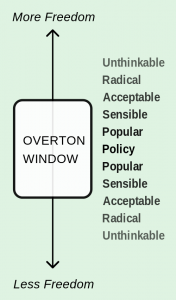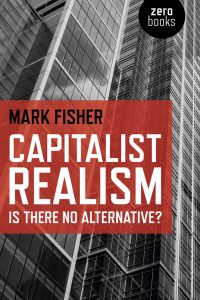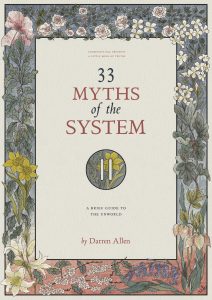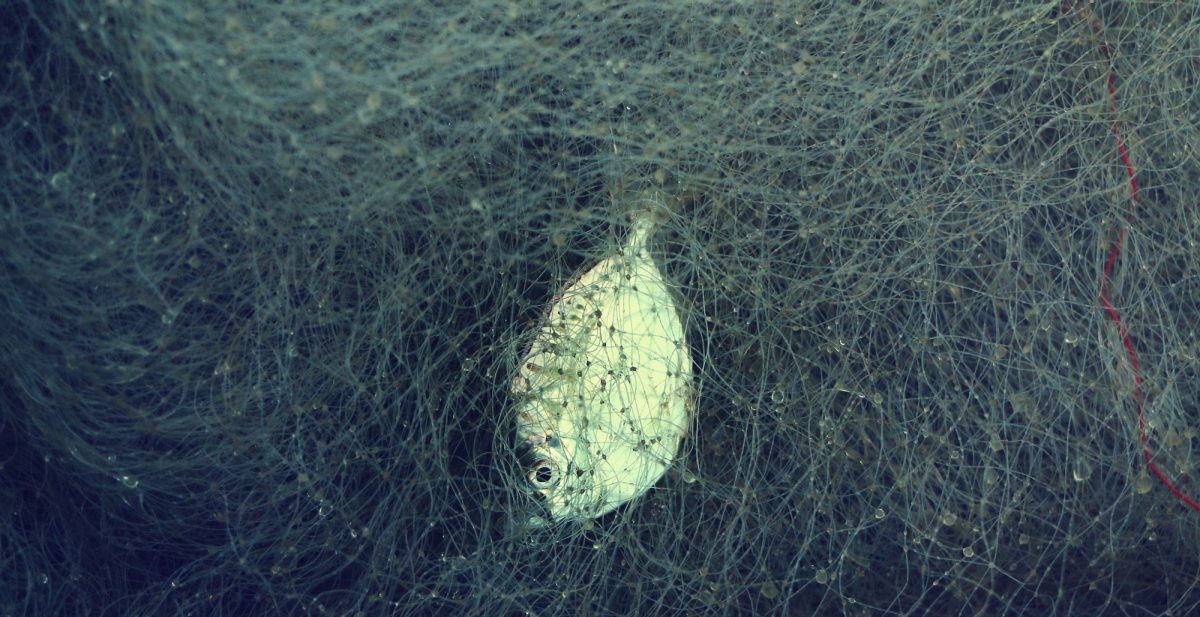Table of Contents
The unravelling, and a ball of thread
2018 was a watershed year for public awareness of ecological and climate breakdown. I had heard about these crises many times over the years, however I never really thought about them in a focused way. Last year, I decided to start studying.
Information on climate change and biodiversity loss is like an endless ball of thread. You pull the thread and more comes out. You keep pulling, the same thing happens. Now several months in, I am still pulling that thread, and still learning. Information ever more curious, ever more serious, ever more disconcerting.
Below, I am highlighting some of the more unorthodox material that I have come across. This is not a comprehensive review but rather a few points and observations on each source, to give you an idea.

Some of these books and articles are controversial and this is not an endorsement of any particular piece in full. Instead, it is an attempt to point out that if we are to be serious about ‘system change’, we need to move the Overton Window well beyond what is politically correct and publicly acceptable today.
Please be warned.
Mark Fisher: Capitalist Realism (2009)

I recently watched Alfonso Cuarón’s Children of Men, which is an amazing film and recommended for anyone interested in societal pre/collapse. This excellent piece goes into the background behind the film, and also discusses the late cultural theorist and author Mark Fisher’s 2009 book Capitalist Realism – Is there no alternative?
This is a great book, written amidst the immediate repercussions of the Global Financial Crisis, and Fisher goes on a journey to discover some of the systemic causes of the crisis. However, as per the subtitle, he comes up emptyhanded in his search for an alternative System: we are well and truly trapped in late stage capitalism.
The limits of capitalism are not fixed by fiat, but defined (and re-defined) pragmatically and improvisationally. This makes capitalism very much like the Thing in John Carpenter’s film of the same name: a monstrous, infinitely plastic entity, capable of metabolizing and absorbing anything with which it comes into contact. (p.6)
It is especially interesting reading this book now, ten years on. Quantitative Easing and other planetary scale politico-financial engineering has been employed to resuscitate a System that is fundamentally unviable and unsustainable. Whilst the shiny facade of capitalism still stands, the foundations are eroding further every passing month. Yet, as per Margaret Thatcher’s assertion, there is no alternative.
Another part of Capitalist Realism I found fascinating was Fisher’s take on mental health. Essentially, the growing mental health crisis, especially as reported among the young people in the West, is attributed to the System of late stage capitalism by Fisher:
Mental health, in fact, is a paradigm case of how capitalist realism operates. Capitalist realism insists on treating mental health as if it were a natural fact, like weather
…
The ‘mental health plague’ in capitalist societies would suggest that, instead of being the only social system that works, capitalism is inherently dysfunctional, and that the cost of it appearing to work is very high. (p.19)
Conveniently, the capitalist System also offers a solution: the manufacturing of new diagnoses, to which new solutions – predominantly chemical – can then be prescribed. Mental health becomes a commodity, financialised and traded on the global market – just like everything else.
Goodreads: Capitalist Realism: Is There No Alternative? by Mark Fisher
Darren Allen: 33 Myths of the System (2018)

Darren Allen’s 33 Myths of the System is a revelation. This book is a whirlwind: confronting, critical, and upsetting. Pick it up at your peril; it will offend.
This book is also one of the best explanations of just how pervasive – and perverted – the System is. Late stage capitalism is the newest and most sophisticated version of the System; however, the System can be considered even broader than that, and forever in flux. As per Fisher: it’s like The Thing.
Allen’s views are nothing short of radical, and he is not holding back in his criticism of the left, the right, and everything in between. Parts of the book make for very uneasy reading because his views are so far from what is generally accepted. Several parts I have to disagree with, however the book really makes you question things. Much of the prose is visceral and compelling.
There are many takeaways from this book and I will name just a few. One that struck me was Allen’s description of what basically amounts to self-oppression. Essentially, in the wealthier countries, we have internalised the demands of the System to such extent that we need little external coercion to keep on the straight and narrow, forever permeating the System:
… exploitation, ownership and production have all been, to an extraordinary extent, internalised. Who is the capitalist boss oppressing the freelance teacher, the Uber-driver, the Airbnb host or the office temp? There are owners and managers out there, somewhere, but their immediate physical presence seems somehow to have evaporated, while the exploitative power within their bodies seems also to have magically melted away (p.48)
This is terrifying, because it means that we really cannot see the System at all. In our time, the hand has become truly invisible.
Allen too talks about mental health. Whilst his position, like the rest of the book, is very radical, I can see some similarities to the arguments made by Fisher in Capitalist Realism. In wealthy countries our mental wellbeing is diminishing, and both authors make a compelling argument that this is largely because of the System.
Another hair-raising part of the book is Myth 31: The Myth of Reform. Allen makes a solid case on how even reform has been co-opted by the System of late stage capitalism. Reforms act as a ‘pressure relief valve’ when the exploitation boils over. However, reforms are illusory. The post-reform ‘new normal’ is a mere perception, whilst the System itself carries on unabated, perhaps even strengthened by the challenge.
Redistribution of wealth, systemic exploitation of land and labour, thought control in a democratic society, radical self-knowledge, truthful utopia, genuine revolution and profound insurrection, unconditional love, the reality of death, consciousness and other terrifying ‘subjectivities’ are well off the menu for the ‘radical’ and her system.
Likewise, giving workers the power to vote for employee of the month, beer in the office, gay bosses, community spirit, bean-bags in the coffee room, amusing posters, family days, staff discounts, limited control over production, anarchist-trousers and, for the miserable millions building the profits of Amazon, Apple, Walmart, Primark, Cargill, Bechtel, Aramco, Ikea and Tesco, a slightly higher wage than they could find elsewhere — yep! (pp.224-225)
Allen’s conclusion is that no individual or group is powerful enough to truly challenge the System due to its enormity, tentacular nature, infinite ability to metamorphose, and sheer momentum.
However, Nature can:
We, those of us who even want to understand the problem, are stupendously weak. A few scattered oddbods set against a mechanism, ten-thousand years in the making, which has invaded every last recess of the natural world and the human mind. It is everywhere at all times, in all people. It is the polluted body, the restless emotion and all thought based thereon. We don’t stand a chance.
We don’t — but I know someone who does!
We have an ally in our long struggle against the Zone of Evil, an ally which is to the system, as the system is to us; unimaginably more powerful. Powerful on an epic, universal scale. This ally goes by a few names, but we’ll use here the least controversial, the one closest to common usage; nature. Nature is a more effective activist than man; and she, unlike us, is not one for discussion. Nature does not vote, or protest, or write petitions, or form unions, or write stern letters, or launch social media campaigns. She prefers to effortlessly sweep the world away. (pp. 264-265)
Ultimately, Allen calls for anarchy. He calls for people who recognise the stakes to get ready for when societal collapse hits critical scale. Note that according to Allen, ‘anarchism is the rejection of domination’, which is different to the mainstream understanding of the term.
A very controversial and provocative read that will question your worldview.
Goodreads: 33 Myths of the System by Darren Allen
Morningstar & Palmer: The Manufacturing of Greta Thunberg – for Consent (2019)
Today, we find ourselves in a culture so disconnected from reality that it considers economic growth far more valuable than the planetary ecosystems that sustain all life.
…
the urgency we bear witness to today, is due to a fear far greater than the collapse of the planetary biosphere, that is – the collapse of the capitalist economic system. (Act VI)
Cory Morningstar and Forrest Palmer’s exposé and conspiracy theory on NGO-ization and ‘the manufacturing of consent’ for the financialisation of nature is a six-part series published on the Wrong Kind of Green:
- Act I: The Political Economy of the Non-profit Industrial Complex
- Act II: The Inconvenient Truth Behind Youth Cooptation
- Act III: The Most Inconvenient Truth – Capitalism is in Danger of Falling Apart
- Act IV: The House is on Fire & the 90 Trillion Dollar Rescue
- Act V: The New Green Deal is the Trojan Horse for the Financialization of Nature
- Act VI: A Decade of Social Manipulation for the Corporate Capture of Nature (Crescendo)
Note: I hesitate to bring up this series because the last thing I want to do is to discredit Greta Thunberg in any shape or form. I only include this content here as another perspective into the System, and not to question Greta or her fantastic work. The same goes for the Extinction Rebellion and Alexandria Ocasio-Cortez, who are also criticised by Morningstar and Palmer. I believe their work to push for major change is immensely important.
The broader conspiracy theory described in the series is too curious to ignore offhand. Morningstar and Palmer’s key arguments can be summarised as follows:
- Non-Government Organisations (NGOSs), including many – seemingly grassroots – climate organisations, are in fact part of the late capitalist System via behind-the-scenes networks
- The System is co-opting youth and their desire to fight for their future, in an effort to steer the outcome in a certain direction
- The Green New Deal (GND), and especially its technology-reliant energy transformation aspect, is essentially a front to resuscitate the failing late capitalist System, which is running out of new frontiers to exploit for profit
- Finally, the GND is a Trojan Horse, a vehicle to get to the goal of an unrestrained financialisation of nature (something that Patel and Moore have warned us about)
The reporting is somewhat sensationalised and breathless, and highly opinionated. However, it does raise a forceful question: Is it possible that something as seemingly radical as the Green New Deal to be just an illusion of reform? This would fit Darren Allen’s Myth of Reform to a tee.
One can argue, and many have, that the GND is the best plan yet to ‘solve’ climate change and trigger a fast transition to renewables at scale. However, radical as it may sound, it is still a wholly within-system response to the ongoing crisis. (By definition, any out-of-system response is unthinkable to people trapped in the System.)
For all its merits, the GND is not questioning the premise of late stage capitalism, aka the System itself. Whilst very welcome and much better than any alternative plan I have come across, it is not the ‘system change’ that many have been hailing for.
A genuine rebellion against ecological devastation does not – and cannot – turn its back on capitalism, imperialism, militarism, sexism (patriarchy, misogyny) and racism (white supremacy). The main drivers of our accelerating environmental crisis. Marching for capital under the guise of marching for revolution is a fool’s game. All roads lead to the corporate capture, theft and pillage of what remains of our already decimated planet. (Act V)
We have planetary boundaries that we must live within if life on Earth is to continue in some shape or form. These boundaries are non-negotiable. We can lie to ourselves all we want, in all of our anthropocentric glory, but it won’t change the reality. We can paint it green, we can share our illusions in glossy brochures and make them go viral on shiny screens – the biosphere does not give a flying f__k. If our society was actually sane, we would recognize these said “solutions” as delusions – but sadly that is not the case. Disconnected from nature – and more and more, disconnected from each other – we are lost.
Nature doesn’t deal. (Act VI)
Overall, Morningstar and Palmer’s conspiracy theory makes for an interesting read, to be taken with a grain of salt. At the very least, it does highlight the intense power relations and interconnectedness in the NGO-industrial complex in a compelling way – and the very real and imminent threat of a planetary scale financialisation of nature.
Note: This piece from Kenn Orphan touches on the main themes of the above series in a more condensed form: Greenwashing the Climate Catastrophe.
See the System
As mentioned, some of the content referred above is controversial. It will make you uncomfortable, should you choose to explore it.
Mainstream media, by definition, is part of the System; see The Myth of Truth. You won’t be seeing this type of content there anytime soon.
That doesn’t mean that critical thinking and dissent does not exist; it just means that you have work harder to discover it. Unfortunately, the System is masterful in keeping you trapped in a cycle of hollow busyness, to discourage any such exploration and discovery.
To change the System you must first see the System.
But you must make the time and the headspace to see it.
References
- Hero image: Fish in a net by Vikas Anand Dev
- Wikipedia: The Overton Window
- Alfonso Cuarón (2006): Children of Men
- Stephen Dalton on BFI: Children of Men: Why Alfonso Cuarón’s anti-Blade Runner looks more relevant than ever
- Mark Fisher: Capitalist Realism – Is there no alternative?
- Florian Opitz’s film ‘System Error’ on Al Jazeera: Growing Pains: The Ecological Cost of an Insatiable Economy
- Margaret Thatcher: ‘There is no alternative’
- Jean Tweng on The Conversation: The mental health crisis among America’s youth is real – and staggering
- Richard Smith’s review of Seamus O’Mahony’s ‘Can Medicine Be Cured? The Corruption of Medicine.’ on The BMJ: The most devastating critique of medicine since Medical Nemesis by Ivan Illich in 1975
- Goodreads: Capitalist Realism: Is There No Alternative? by Mark Fisher
- Darren Allen: 33 Myths of the System
- The New York Times: Deaths From Drugs and Suicide Reach a Record in the U.S.
- Darren Allen: Anarchism at the end of the World
- Goodreads: 33 Myths of the System by Darren Allen
- Cory Morningstar & Forrest Palmer: Act I: The Political Economy of the Non-profit Industrial Complex
- Bram Büscher & Robert Fletcher on The Conversation: Nature is priceless, which is why turning it into ‘natural capital’ is wrong
- Raj Patel & James W. Moore on the end of commoning and its full financial externalisation in Seven Cheap Things (2018)
- Kenn Orphan on CounterPunch: Greenwashing the Climate Catastrophe
- Darren Allen: The Myth of Truth
- Steve Cutts: Are you lost in the world like me?
- Superflux: Trigger Warning (read more)
Thanks to everyone who reviewed versions of this essay.
